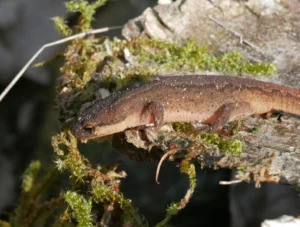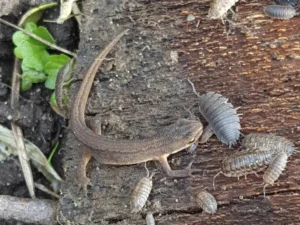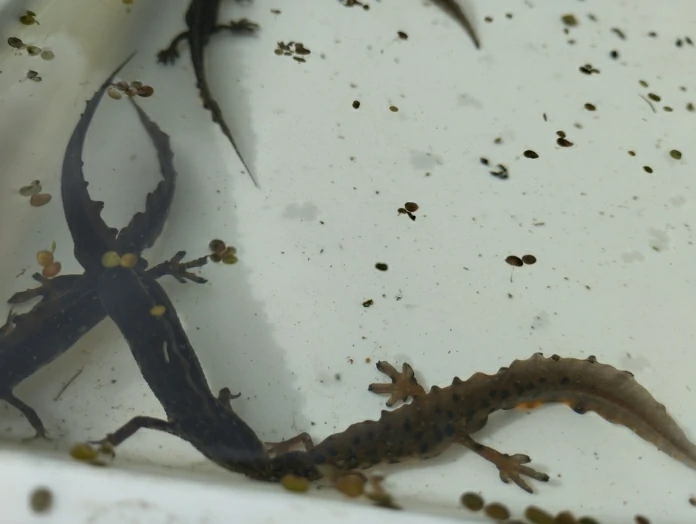You might see a newt quietly moving along the edge of a pond and wonder: do they like being around others, or are they happy alone?
Newts are mostly solitary, but they do have moments of social interaction. They spend most of their time alone, exploring damp soil, ponds, or under rocks. Still, when it’s time to breed or defend territory, they interact in ways that are really surprising.
What “Social” Really Means for Newts
When we say an animal is social, we usually think about dogs, birds, or even fish that hang out in groups. But for newts, being social is different.
Newts don’t make big groups. They don’t hunt together, and they don’t share shelters for comfort.

Instead, their social behavior is mostly about breeding, signaling, and protecting their space.
For example:
-
Male newts often show off bright colors or wave their tails in water to attract females.
-
They might chase away other males that come too close.
-
Some species even release subtle chemical signals in the water to let others know they’re nearby.
So “social” for a newt isn’t hanging out with friends. It’s interacting when needed and otherwise being independent.
How Newts Communicate Without Sound
Have you noticed that newts don’t make noises like frogs or birds? That doesn’t mean they can’t communicate at all. They just do it in ways you can’t easily see or hear.
Newts use body movements, skin color, and chemicals in the water to send messages.
-
A male waving his tail in water is basically saying: “I’m here and ready to mate.”
-
A subtle color change can signal stress or aggression.
-
Chemicals in the water help others sense them from a distance.
These methods are quiet, but really effective. For a newt, social life isn’t about chatting, it’s about knowing who’s around without getting into trouble.
Why Most Newts Prefer Being Alone
Outside breeding season, newts usually like to be alone. They like space to hunt, hide, and rest. Being alone has some big advantages:
-
Less competition for food: They eat small insects, worms, and tiny aquatic animals. If many newts crowded the same spot, there wouldn’t be enough for everyone.
-
Safer hiding: Alone, they can slip under leaves, stones, or soil without attracting too much attention from predators.
-
Less stress: Newts are sensitive to changes in their surroundings. Too many neighbors can make them anxious, which can affect their health.

Even though it looks lonely, this solo lifestyle actually helps them survive better in the wild.
Do Newts Form Bonds With Other Newts?
You might wonder: if they’re mostly alone, do they ever form bonds?
The short answer is: no, newts don’t make long-term friendships like mammals do.
However, during breeding season, you can see temporary pairings.
A male and female might stay close for a few days while eggs are laid and fertilized. After that, they go back to their separate lives.
This temporary closeness is nature’s way of balancing reproduction and independence.
It’s not friendship, but it’s social behavior that’s very important for survival.
How Breeding Brings Newts Together
Breeding season is the main time newts get social. Males do courtship displays to attract females.
These displays can look really beautiful and even a bit complicated:
-
Tail waving in water
-
Showing bright colors
-
Swimming in loops around the female
Females respond by choosing a mate, and sometimes they follow one male for a short distance before laying eggs.

This period shows that newts are social when it really counts. It’s not casual hanging out, it’s focused interaction for reproduction.
Do Newts Show Aggression Toward Each Other?
Even during social moments, newts can be territorial. Males often compete for the best spots in ponds or under logs.
Aggression is usually mild: tail flicks, chasing, or showing off body posture. Physical fights are rare but can happen if space is tight.
This shows that newts are social, but careful. They want to interact only when it matters and avoid unnecessary conflict.
Can Newts Recognize Each Other?
Scientists have studied whether newts can tell individuals apart.
The evidence is mixed, but it seems they can recognize familiar scents or chemical signals in the water.
This helps them avoid fights they don’t need. It also lets males know if a female has already been fertilized by another male.
So, while they don’t have friendships, they remember certain neighbors and respond in the right way.
Why Newt Social Behavior Matters for People
If you keep a pond or watch wildlife, understanding newt social life helps you avoid stressing them:
-
Don’t overcrowd small ponds; newts need space.
-
Avoid disturbing hiding spots, since most interactions happen quietly.
-
Remember breeding season is a key social time, they interact in ways that are critical for the next generation.
Respecting how they live keeps them healthy and happy.
Conclusion
Newts are mostly alone, but they are social when it counts, especially during breeding and defending territory.
They communicate quietly, using movements, colors, and chemicals in the water.
They don’t make friends, but they interact in subtle, meaningful ways that help them survive and reproduce.
Watching newts shows us that social behavior doesn’t have to be loud or obvious.
Sometimes, a tail wave, a chemical signal, or a quick chase in the water is enough to keep their small world alive.
Even though they spend most of their lives alone, newts have a quiet, interesting social life that’s easy to miss, but really important.
Hi, my name is Ezra Mushala, i have been interested animals all my life. I am the main author and editor here at snakeinformer.com.

